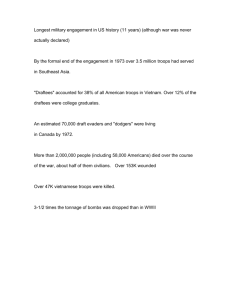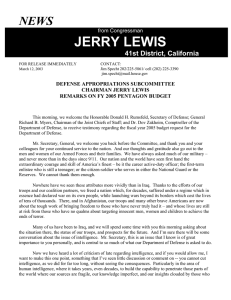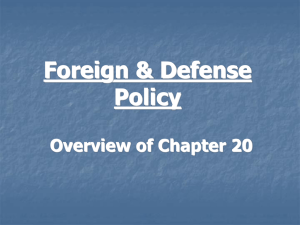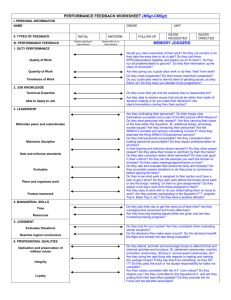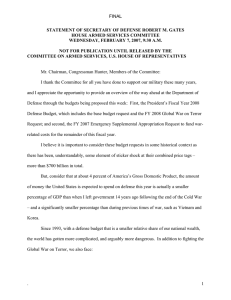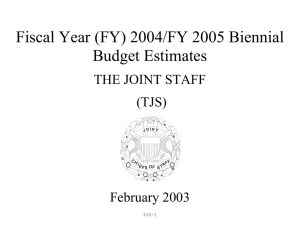CHAIRMAN HUNTER OPENING STATEMENT HOUSE ARMED SERVICES COMMITTEE DUNCAN HUNTER – CHAIRMAN
advertisement
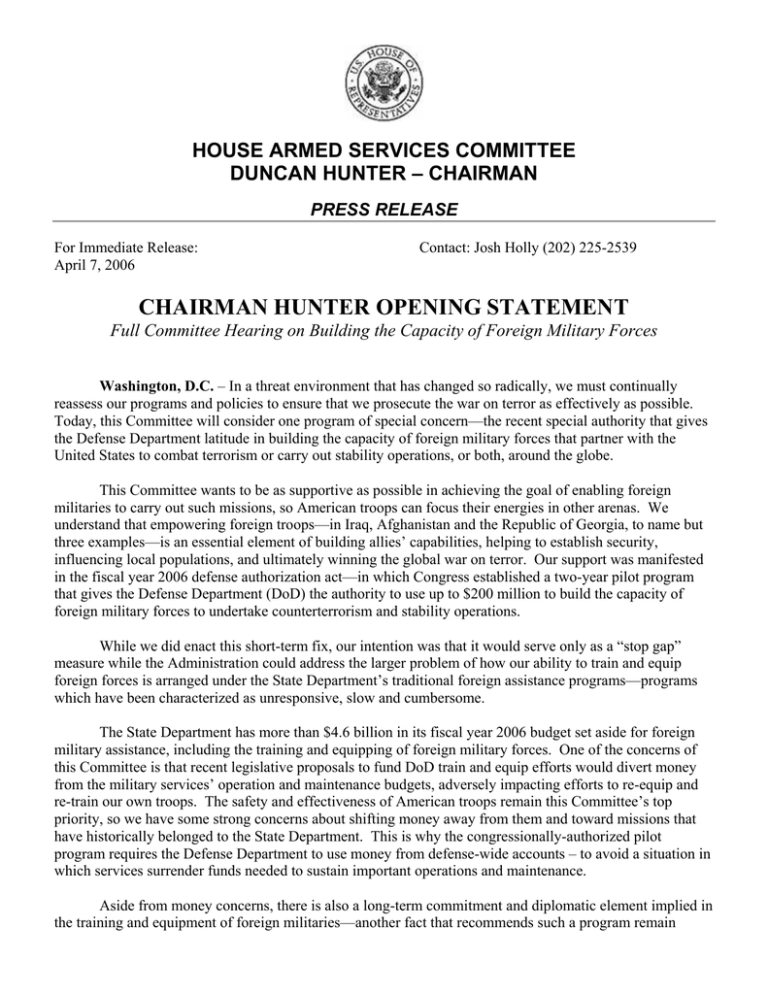
HOUSE ARMED SERVICES COMMITTEE DUNCAN HUNTER – CHAIRMAN PRESS RELEASE For Immediate Release: April 7, 2006 Contact: Josh Holly (202) 225-2539 CHAIRMAN HUNTER OPENING STATEMENT Full Committee Hearing on Building the Capacity of Foreign Military Forces Washington, D.C. – In a threat environment that has changed so radically, we must continually reassess our programs and policies to ensure that we prosecute the war on terror as effectively as possible. Today, this Committee will consider one program of special concern—the recent special authority that gives the Defense Department latitude in building the capacity of foreign military forces that partner with the United States to combat terrorism or carry out stability operations, or both, around the globe. This Committee wants to be as supportive as possible in achieving the goal of enabling foreign militaries to carry out such missions, so American troops can focus their energies in other arenas. We understand that empowering foreign troops—in Iraq, Afghanistan and the Republic of Georgia, to name but three examples—is an essential element of building allies’ capabilities, helping to establish security, influencing local populations, and ultimately winning the global war on terror. Our support was manifested in the fiscal year 2006 defense authorization act—in which Congress established a two-year pilot program that gives the Defense Department (DoD) the authority to use up to $200 million to build the capacity of foreign military forces to undertake counterterrorism and stability operations. While we did enact this short-term fix, our intention was that it would serve only as a “stop gap” measure while the Administration could address the larger problem of how our ability to train and equip foreign forces is arranged under the State Department’s traditional foreign assistance programs—programs which have been characterized as unresponsive, slow and cumbersome. The State Department has more than $4.6 billion in its fiscal year 2006 budget set aside for foreign military assistance, including the training and equipping of foreign military forces. One of the concerns of this Committee is that recent legislative proposals to fund DoD train and equip efforts would divert money from the military services’ operation and maintenance budgets, adversely impacting efforts to re-equip and re-train our own troops. The safety and effectiveness of American troops remain this Committee’s top priority, so we have some strong concerns about shifting money away from them and toward missions that have historically belonged to the State Department. This is why the congressionally-authorized pilot program requires the Defense Department to use money from defense-wide accounts – to avoid a situation in which services surrender funds needed to sustain important operations and maintenance. Aside from money concerns, there is also a long-term commitment and diplomatic element implied in the training and equipment of foreign militaries—another fact that recommends such a program remain under the State Department umbrella. Training and equipping foreign forces is not an easy job, since this mission involves more than providing simple basic training, some weapons and trucks. Building a competent, professional force also requires a government behind that force that is not wracked with corruption and that is capable of paying its soldiers. Otherwise, those soldiers will not be dependable in a crisis, as we’ve seen. We may be encouraged by the task force led by U.S. Marines that recently completed training two Georgian logistics battalions; when they deploy, they will be part of the international coalition engaged in Iraq stability operations. But, we must also remember that we had to train the Georgian battalions twice because there were some dependability problems the first time around. All this goes to my key concern today: If our foreign military assistance programs are currently not flexible or responsive or comprehensive enough to meet this war’s frontline demands, we need to look critically at how these programs are arranged, funded and implemented—and then make the necessary strategic and institutional changes. We asked the Administration for recommendations to amend the Foreign Assistance laws in Title 22, the part of the U.S. Code that governs activities of the State Department—which is where a long-term solution must lie. We’d like to hear how you might address the shortfalls and challenges in the larger foreign assistance program, because the longer we wait to address the root of the problem, the more difficult it will be to fix. It seems likely that the need to train and equip foreign forces will remain a necessary mission as we continue to fight the global war on terror. We should therefore ensure that we can use the federal funds intended for training and equipping foreign forces as easily and as quickly as situations on the ground demand. ### http://armedservices.house.gov/
